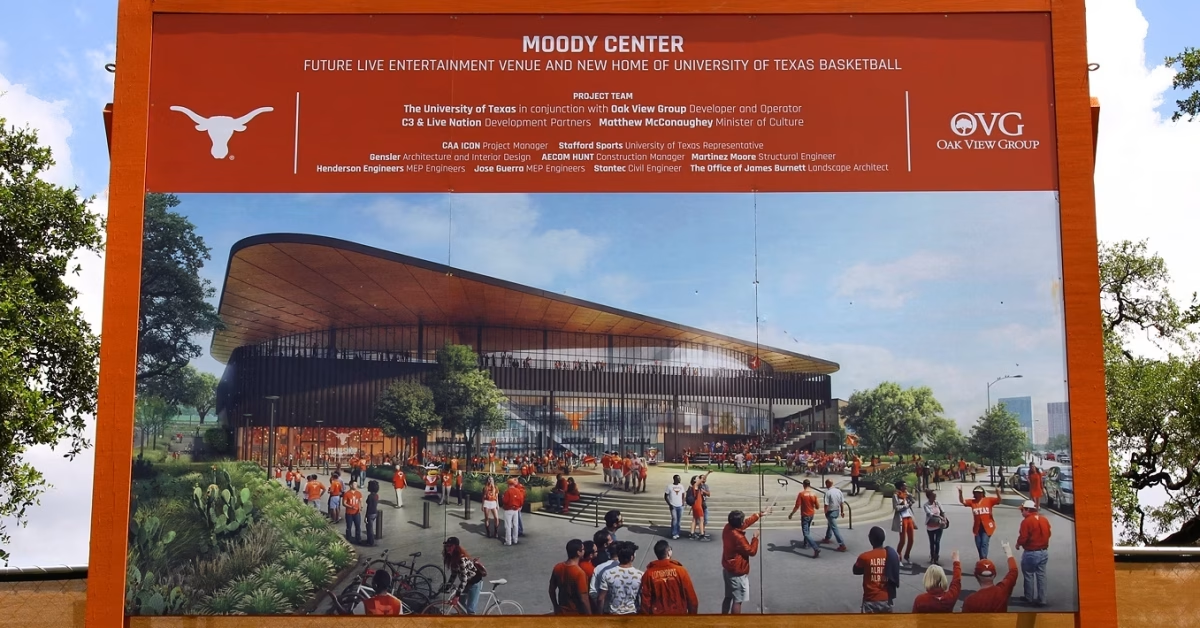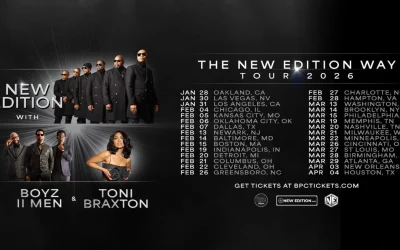Federal antitrust investigators are examining whether Oak View Group (OVG) and Legends illegally coordinated their bids to design, build and run the University of Texas’ Moody Center, according to a Bloomberg report that cited people familiar with the matter.
The U.S. Department of Justice’s criminal-division probe is said to focus on whether the two live-entertainment heavyweights “colluded” during a 2018 solicitation that ultimately awarded OVG a 35-year development and operating deal for the privately financed venue. Legends, which never joined the project, nonetheless drew investigators’ interest over possible discussions with its rival before bids were submitted, the sources told Bloomberg.
No charges — Yet.
Neither company has been formally accused of wrongdoing, and antitrust inquiries do not always result in enforcement actions. The University of Texas is not a target of the investigation, the report noted. DOJ attorneys began gathering evidence while Joe Biden was president and have continued the work under President Donald Trump, interviewing witnesses and reviewing records in recent months.
OVG Facing Multiple Federal Collusion Allegations
The recent report is not the first time that Oak View Group has appeared in headlines related to federal antitrust scrutiny. The company, which has former AEG head Tim Lieweke and former Live Nation/Ticketmaster chair and mega-manager Irving Azoff at the top of its leadership, was also centered in the DOJ probe of Live Nation/Ticketmaster.
In the DOJ’s massive antitrust lawsuit filed in 2024 against the entertainment giant, antitrust authorities allege that OVG chose to deliberately avoid competing with Live Nation, instead colluding with them to avoid conflicting business lines, sometimes at the direction of LNE CEO Michael Rapino.
“Live Nation and Oak View Group have colluded and established a partnership to allocate business lines, avoid competing with each other, and chart a mutually beneficial plan to cement Live Nation’s dominance,” reads one section of the 100-plus page complaint filed in District Court for the Southern District of New York last May. “Oak View Group’s experience and relationships with venues and artists make it particularly well-suited to be a real competitor to Live Nation in the United States concert promotion business,” the complaint continued.
READ MORE: DOJ Alleges Oak View Group Colluded with Live Nation in Lawsuit
Irving Azoff has also been a key behind-the-scenes player in the massive lobbying effort aimed at codifying Live Nation Entertainment’s “FAIR” Ticketing proposales into law across the country. Organizations directly led by Azoff, his family members, or close business and legal allies, have formed the core of the “Fix The Tix” coalition, which has pushed hard to see event promoters and other operators granted full regulatory control over the entire ticketing industry- primary box office and resale.
Consider the Music Artists Coalition, an industry group claiming to represent music creators that was heavily involved in the lobbying effort to get a California bill aimed at curbing Ticketmaster’s market dominance killed. At least seven of the 17 members of the Music Artists Coalition board have connections to Ticketmaster:
- Businessman Irving Azoff, the former CEO of Ticketmaster whose new company the Oak View Group acts as a “pimp” for Ticketmaster, according to The American Prospect;
- Susan Genco, co-president of another of Azoff’s businesses, The Azoff Company;
- Ali Harnell, who works for Live Nation;
- Coran Capshaw, founder of the artist management company Red Light Management, who owns a stake in Live Nation;
- Attorney Elliot Groffman, who works for Red Light Management;
- Pop star Meghan Trainor and singer-songwriter Maren Morris, who both run ticketing for their live events through Ticketmaster.
The connections go even deeper than that, based on TicketNews analysis of the MAC board. Performers on the board include Don Henley (longtime client of Irving Azoff), Dave Matthews (longtime client of Coran Capshaw), while Morris is managed by Capshaw and Trainor is managed by Azoff. Former MAC president Jack Quinn and board member Jordan Bromley were both partners at Manatt Phelps & Phelps, a law firm with ties to Azoff and Henley. Kristen Foster is a PR flack with ties to a huge number artists managed by Azoff or Live Nation, including fellow MAC board member Anderson .Paak.
FURTHER READING | How a Ticketmaster bill apparently went off the rails (Capitol Weekly)
Moody Center’s rapid rise
Completed in April 2022 for roughly $340 million, the 15,000-seat Moody Center replaced the Frank Erwin Center and serves as home court for Longhorns men’s and women’s basketball while hosting a robust slate of high-grossing concerts. The arena sits on university-owned land but was built with private capital, including a $130 million naming-rights grant from the Moody Foundation. Partners listed on the deal alongside OVG include Live Nation, C3 Presents and actor-producer Matthew McConaughey, a UT alumnus and “Minister of Culture” for the venue.
Part of a broader antitrust drumbeat
News of the inquiry lands as Washington intensifies scrutiny of the live-events ecosystem. Earlier this month TicketNews covered a separate DOJ criminal probe into Live Nation and AEG over pandemic-era refund practices, as well as the department’s antitrust lawsuit against Live Nation Entertainment and Ticketmaster, which is seeking to split the companies up.
While the Moody Center bid dates back more than six years, collusion allegations can expose companies and executives to felony charges under the Sherman Act if prosecutors conclude the parties suppressed competition. A conviction can carry steep corporate fines and potential jail time for individuals.
What’s next
Representatives for OVG, Legends and the DOJ declined to comment when contacted by Bloomberg. The department has not indicated a timetable for a decision on possible charges.
For venue operators and ticket-industry stakeholders, the investigation underscores regulators’ growing willingness to test novel antitrust theories in entertainment — even on projects that, like Moody Center, rely on private funding and promise community benefits.




